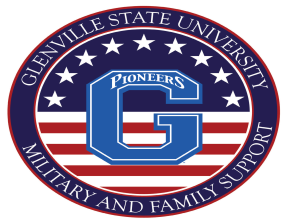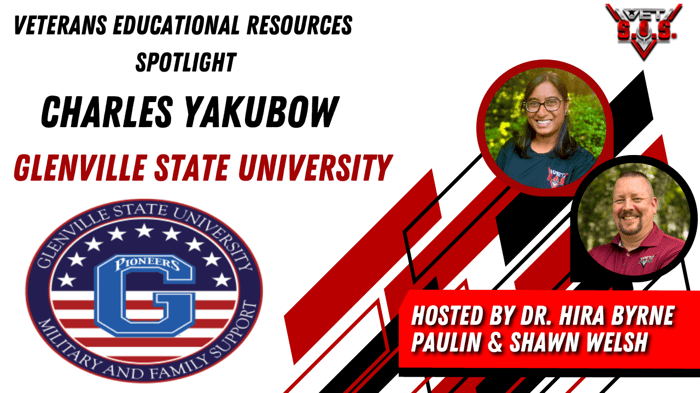Military Support in Higher Education: How Glenville State University Leads with Compassion and Connection
Military support in higher education isn’t just a checklist of services—it’s a commitment to understanding the unique journeys of veterans, active-duty personnel, and military families as they transition into academic environments. At Glenville State University, that commitment is more than policy—it’s personal.
In a recent episode of the VET S.O.S. Veteran Educational Resources Spotlight, Dr. Hira and Shawn Welsh had a compelling conversation with Charles Yakubow, Director of Military and Family Support at Glenville State University. With over two decades of experience in social work and a personal history as a military child, Charles brings both professional insight and lived empathy to his work supporting military-connected students.
A Life Rooted in Service
 Charles Yakubow
Charles YakubowCharles Yakubow’s dedication to military support in higher education is rooted in his own upbringing. As an Air Force brat, Charles moved frequently during his childhood, attending multiple schools and adjusting to new environments across the globe. One of his longest stays was at Alcantara Air Force Base in England, where he lived for five years. These formative experiences gave him firsthand understanding of the instability military families face—an insight that now shapes his work.
“I’ve never deployed,” Charles says, “but I’ve lived through the moves, the adjustments, and the challenges of being a dependent. I know what that feels like, and I want to support others going through it.”
That deep sense of empathy informs everything he does in his role at Glenville State University.
Why Small Schools Excel at Military Support in Higher Education
 With approximately 1,700 total students and 124 military-affiliated individuals, Glenville State University may be small, but its impact is mighty. The school’s size allows for a more personalized approach to education—a crucial element of military support in higher education. Smaller class sizes mean greater access to faculty, tighter-knit communities, and the ability to tailor services to individual needs.
With approximately 1,700 total students and 124 military-affiliated individuals, Glenville State University may be small, but its impact is mighty. The school’s size allows for a more personalized approach to education—a crucial element of military support in higher education. Smaller class sizes mean greater access to faculty, tighter-knit communities, and the ability to tailor services to individual needs.
“Our student-to-veteran ratio is among the best,” Charles explains. “It’s not about the numbers—it’s about the depth of support we can offer.”
Veterans and dependents often benefit from this “high-touch” environment where staff members know students by name. In contrast to larger universities, where students may feel like anonymous figures in a crowd, Glenville fosters a sense of belonging.
Programs That Prioritize People
At the heart of Glenville State’s military support in higher education is its resource infrastructure. One key component is the Veterans Resource Center—a dedicated lounge for service members and their families. While Charles admits the lounge is underutilized due to the rise of online learning and off-campus living, its presence remains vital.
“It’s a safe space,” he says. “Even if it’s only used occasionally, it's there when someone really needs it.”
But Charles is quick to emphasize that physical spaces are only part of the equation. Real support happens through conversation, intervention, and flexibility. In one example, Charles describes working directly with the university's CFO and president to forgive outstanding tuition balances for struggling veteran students.
“We’ve helped students who were on the brink of dropping out due to financial barriers,” he shares. “Helping them finish their degree isn’t just educational—it could be life-changing.”
Saving GI Bill Benefits Through Strategic Credit Agreements
One of Glenville State’s standout initiatives is an articulation agreement between its Military and Family Support Office and the Criminal Justice Department. This agreement allows correctional officers, law enforcement personnel, and National Guard members to receive academic credit for their professional training. The program not only accelerates degree completion but also helps veterans conserve their GI Bill benefits for future graduate-level education.
This is a clear example of how military support in higher education can—and should—go beyond surface-level benefits. By acknowledging prior learning and experience, Glenville empowers military students to succeed faster and more affordably.
Supporting the Whole Family
Charles emphasizes that Glenville State’s mission extends beyond the individual veteran.
“Our support is for the entire military family,” he explains. “Spouses, children—they’re part of this journey too.”
This holistic philosophy is especially resonant for Dr. Hira, who is a military spouse herself. She reflects on the importance of educational institutions that recognize the contributions and challenges faced by dependents.
Military support in higher education, when done right, addresses the full spectrum of needs. From childcare to academic flexibility, from mental health services to career counseling, families deserve as much investment as the service members themselves.
An Open-Door Policy for All
Perhaps the most inspiring aspect of Charles’s work is his willingness to assist any veteran or military-affiliated student—regardless of whether they attend Glenville.
“I probably shouldn’t say this,” he laughs, “but I’ll help anyone. If you’re a veteran or dependent and need guidance, reach out. Even if Glenville isn’t your school, I’ll do what I can.”
This commitment extends to his involvement with local veteran service organizations in West Virginia, including one based in Morgantown that helps community members find mental health resources, financial assistance, or educational direction. This level of outreach exemplifies what military support in higher education should strive to be: collaborative, compassionate, and community-driven.
Making the Connection
For those interested in learning more about Glenville State University’s military programs, Charles recommends visiting www.glenville.edu. Under the “Admissions” tab, visitors can find the Military and Family Support section, which includes comprehensive information on VA education benefits, eligibility requirements, and Charles’s direct contact info.
He can also be reached via email at [email protected], and encourages all military-connected individuals to reach out—whether they need academic guidance, GI Bill information, or simply someone to talk to.
Final Thoughts
As the landscape of military support in higher education continues to evolve, Glenville State University offers a model rooted in sincerity and personalized service. With leaders like Charles Yakubow at the helm, students know they’re more than just beneficiaries of programs—they’re part of a community that understands and values their journey.
In closing the episode, host Shawn Welsh summed it up best: “Every school we’ve talked to shares the same heart. They want you to come to their campus—but if that’s not the right fit, they’ll help you find the one that is.”
That’s not just military support in higher education. That’s humanity in action.





